Commercial HVAC Chigwell
Find Commercial HVAC Services in Chigwell
Get up to 3 Commercial HVAC quotes for your project today! Compare profiles, reviews, accreditations, portfolio, etc... and choose the best service.

Harvey R J
4.754 reviewsUnit 9 Imperial Park, Rawreth Lane, Rayleigh, Essex, SS6 9RS, GBFor almost 40 years we have maintained a high level of workmanship, and have provided a friendly, reliable and honest service to you and your vehicle. RJ HARVEY Welcome To More About Us MOT and Car Service Specialists Established for over 35 years, R J Harvey is one of the most valued & independent service centre and MOT stations in Essex. We are MOT and Car Service Specialists.
- Services
- Why Us?
- Testimonials
- Gallery
Get Quote- JJ
JJ Services
52 reviewsRayleigh, GBJJ Services is a locally owned and operated business serving the community with a wide range of services. We are dedicated to providing high-quality workmanship and exceptional customer service. Our team of experienced professionals is committed to exceeding your expectations.
- Services
- Why Us?
- Gallery
Get Quote 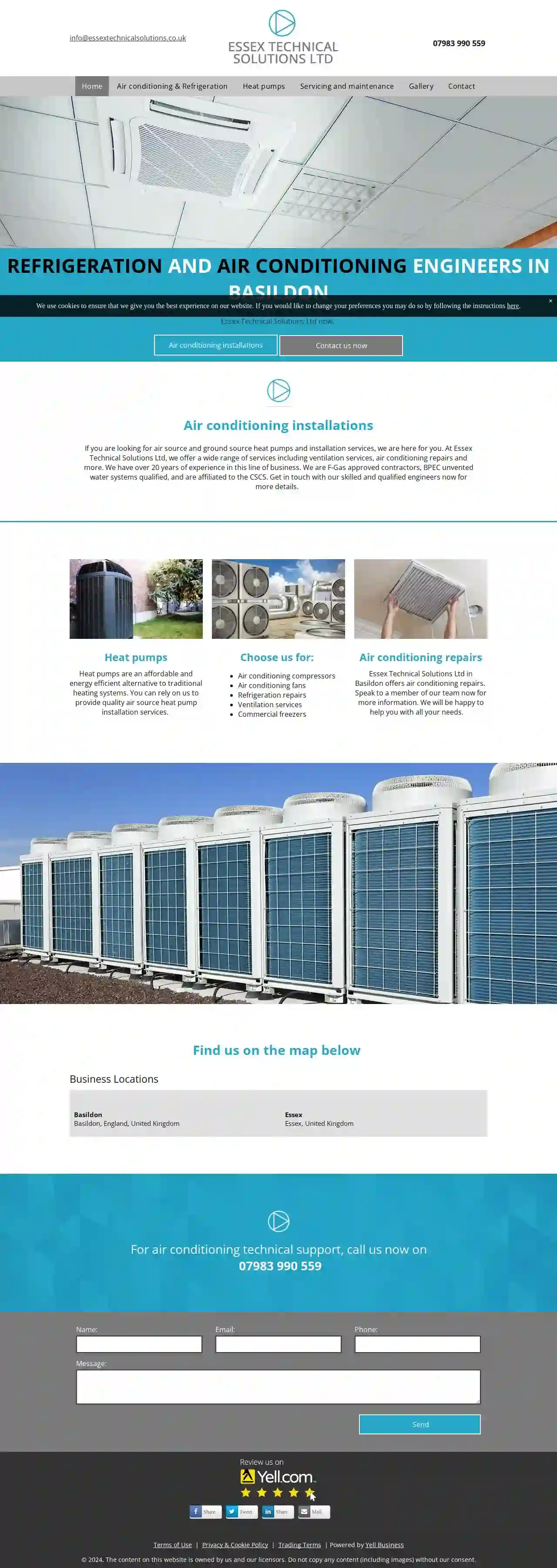
Essex Technical Solutions Ltd
53 reviewsLangdon Hills, Basildon, 24 Nottingham Way, SS16 6TR, GBEssex Technical Solutions Ltd is a professional refrigeration and air conditioning engineering company based in Basildon, Essex. With over 20 years of experience, we offer a wide range of services including air conditioning installations, heat pumps, ventilation services, and more. Our team of skilled and qualified engineers are F-Gas approved contractors, BPEC unvented water systems qualified, and affiliated to the CSCS. We serve customers in Basildon and surrounding areas, providing high-quality air conditioning and refrigeration solutions at competitive prices.
- Services
- Why Us?
- Accreditations
- Gallery
Get Quote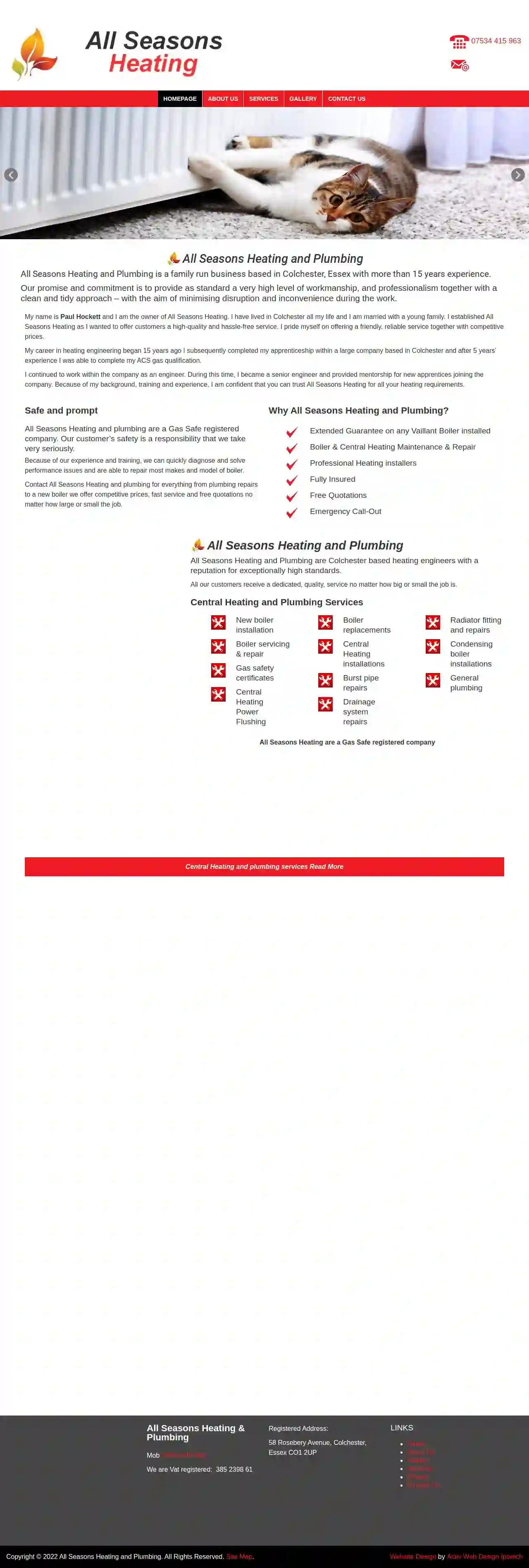
All Seasons Heating
4.916 reviews58 Rosebery Avenue, Colchester, GBAll Seasons Heating and Plumbing is a family run business based in Colchester, Essex with more than 15 years experience. Our promise and commitment is to provide as standard a very high level of workmanship, and professionalism together with a clean and tidy approach – with the aim of minimising disruption and inconvenience during the work. My name is Paul Hockett and I am the owner of All Seasons Heating. I have lived in Colchester all my life and I am married with a young family. I established All Seasons Heating as I wanted to offer customers a high-quality and hassle-free service. I pride myself on offering a friendly, reliable service together with competitive prices. My career in heating engineering began 15 years ago I subsequently completed my apprenticeship within a large company based in Colchester and after 5 years’ experience I was able to complete my ACS gas qualification. I continued to work within the company as an engineer. During this time, I became a senior engineer and provided mentorship for new apprentices joining the company. Because of my background, training and experience, I am confident that you can trust All Seasons Heating for all your heating requirements. Safe and prompt All Seasons Heating and plumbing are a Gas Safe registered company. Our customer’s safety is a responsibility that we take very seriously. Because of our experience and training, we can quickly diagnose and solve performance issues and are able to repair most makes and model of boiler. Contact All Seasons Heating and plumbing for everything from plumbing repairs to a new boiler we offer competitive prices, fast service and free quotations no matter how large or small the job.
- Services
- Why Us?
- Accreditations
- Our Team
- Gallery
Get Quote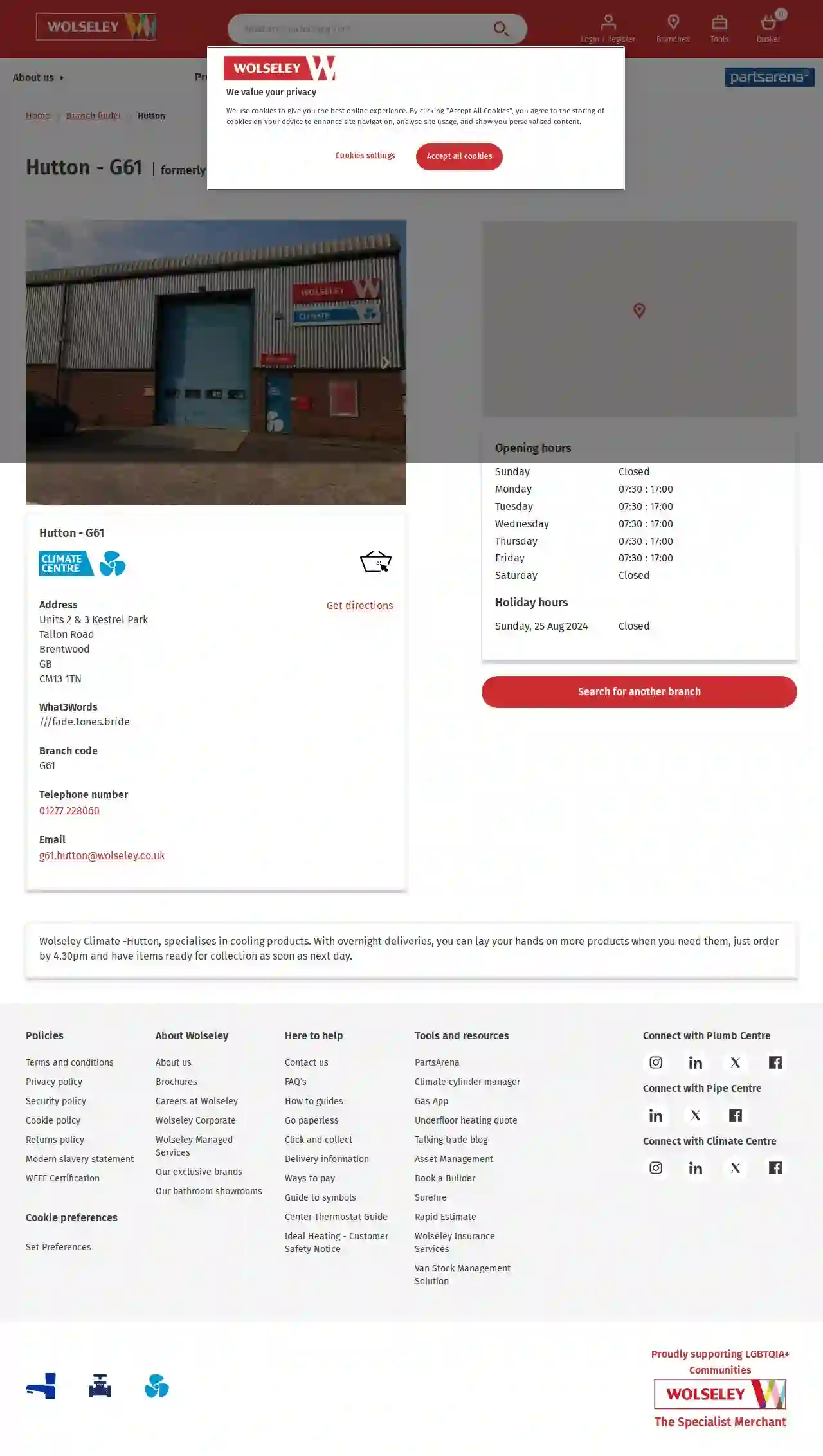
Wolseley Climate
4.516 reviewsTallon Road, Units 2 & 3 Kestrel Park, Brentwood, G61 1TN, GBWolseley is a trusted supplier of plumbing and heating supplies. We have been working with them for many years and have always been impressed with their quality products and competitive prices. With unrivalled expert know-how and first-class customer support, Wolseley offers great value you can trust. Always delivering on their promises, they help their trade customers get the job done right first time with reliable supply of quality products.
- Services
- Why Us?
- Gallery
Get Quote
Comfort Services Group Limited
517 reviewsColchester, GB- Services
- Why Us?
- Gallery
Get Quote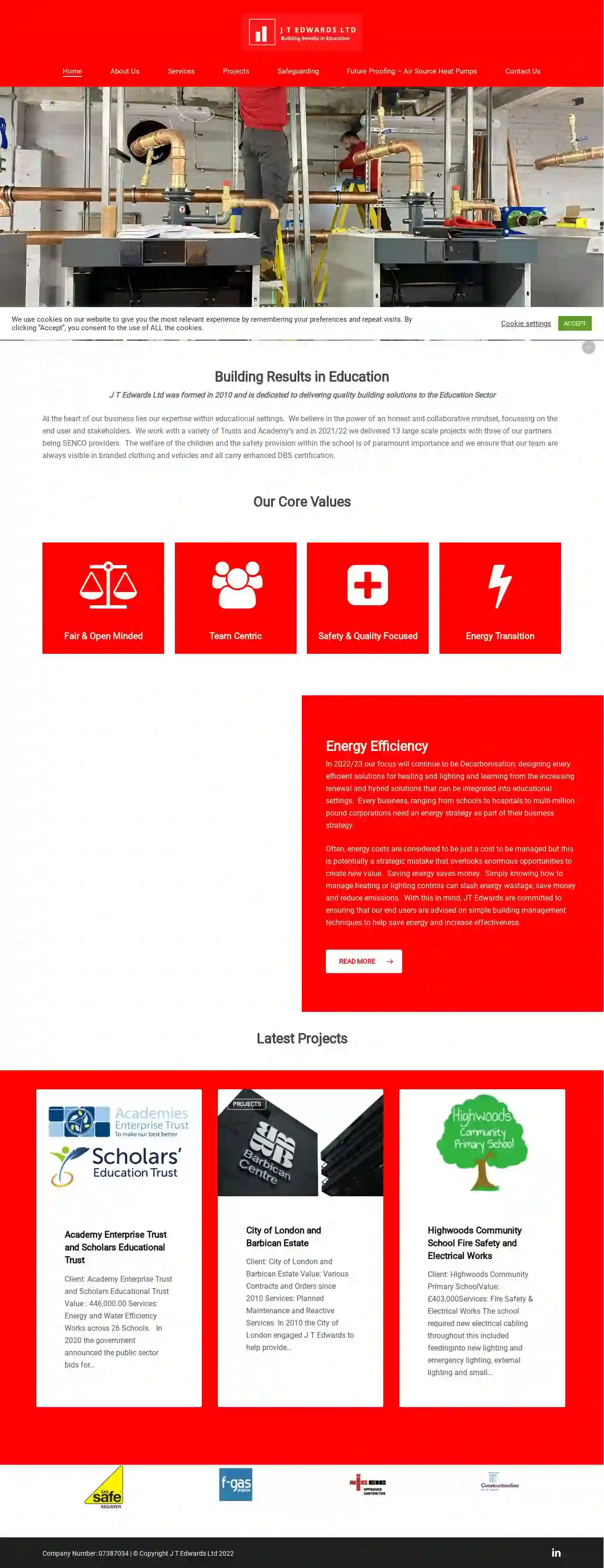
J T Edwards Limited
Not Specified, GBJ T Edwards Ltd was formed in 2010 and is dedicated to delivering quality building solutions to the Education Sector. At the heart of our business lies our expertise within educational settings. We believe in the power of an honest and collaborative mindset, focussing on the end user and stakeholders. We work with a variety of Trusts and Academy’s and in 2021/22 we delivered 13 large scale projects with three of our partners being SENCO providers. The welfare of the children and the safety provision within the school is of paramount importance and we ensure that our team are always visible in branded clothing and vehicles and all carry enhanced DBS certification. Our Core Values are Fair & Open Minded, Team Centric, Safety & Quality Focused and Energy Transition. In 2022/23 our focus will continue to be Decarbonisation; designing enery efficient solutions for heating and lighting and learning from the increasing renewal and hybrid solutions that can be integrated into educational settings. Every business, ranging from schools to hospitals to multi-million pound corporations need an energy strategy as part of their business strategy. Often, energy costs are considered to be just a cost to be managed but this is potentially a strategic mistake that overlooks enormous opportunities to create new value. Saving energy saves money. Simply knowing how to manage heating or lighting controls can slash energy wastage, save money and reduce emissions. With this in mind, JT Edwards are committed to ensuring that our end users are advised on simple building management techniques to help save energy and increase effectiveness.
- Services
- Why Us?
- Accreditations
- Our Team
- Testimonials
- Gallery
Get Quote
Allducts Ventilation Services
9 Milstin Avenue, Canvey Island, SS8 8EE, GBAllducts Ventilation Services Ltd is a specialist commercial ventilation and ductwork contractor based in Chelmsford, Essex. With extensive experience and a commitment to quality, they provide high-quality ductwork and ventilation systems for a wide range range of commercial applications. From standard setups to bespoke systems, Allducts can supply and install all types of ventilation and extraction systems to meet the specific needs of your building. They are approved installers of the CASWELL FIRESAFE® ductwork system, offering a non-coated solution with enhanced fire-resistant properties. Allducts also specializes in plastic ductwork installations, ideal for spaces with high humidity levels, and offers a range of kitchen ventilation solutions, including canopies, extractor fans, make-up air, and odour control units. Their swimming pool ductwork systems feature enhanced internal and external chlorinated protection and are available in various colours. In addition to installations, Allducts provides fire damper testing services to ensure proper functionality and safety. As a CHAS accredited contractor, Allducts prioritizes health and safety, adhering to strict industry standards.
- Services
- Why Us?
- Accreditations
- Our Team
- Testimonials
- Gallery
Get Quote
Essex Air Conditioning and Refrigeration Services
183 Manor Road, Benfleet, SS7 4JD, GBEssex Air Conditioning and Refrigeration Services are a company who are dedicated to providing customers with a dependable and professional range of domestic and commercial air conditioner services for customers throughout Benfleet, Essex and the home counties. Our extensive knowledge of air conditioning and refrigeration units means we are able to continually provide the highest level of air conditioning service, which allows us to accomplish any requirements that are set.We understand the importance of keeping up to date with the latest developments in air conditioning and refrigeration units, which ensures that we can always provide our customers with a specialist service.Essex Air Conditioning and Refrigeration take pride in our ability to offer a professional service for the installation and maintenance of air conditioning and refrigeration units. This has been the foundation for our success as a company, as we have been able to build and sustain relationships with our customers.
- Services
- Why Us?
- Gallery
Get Quote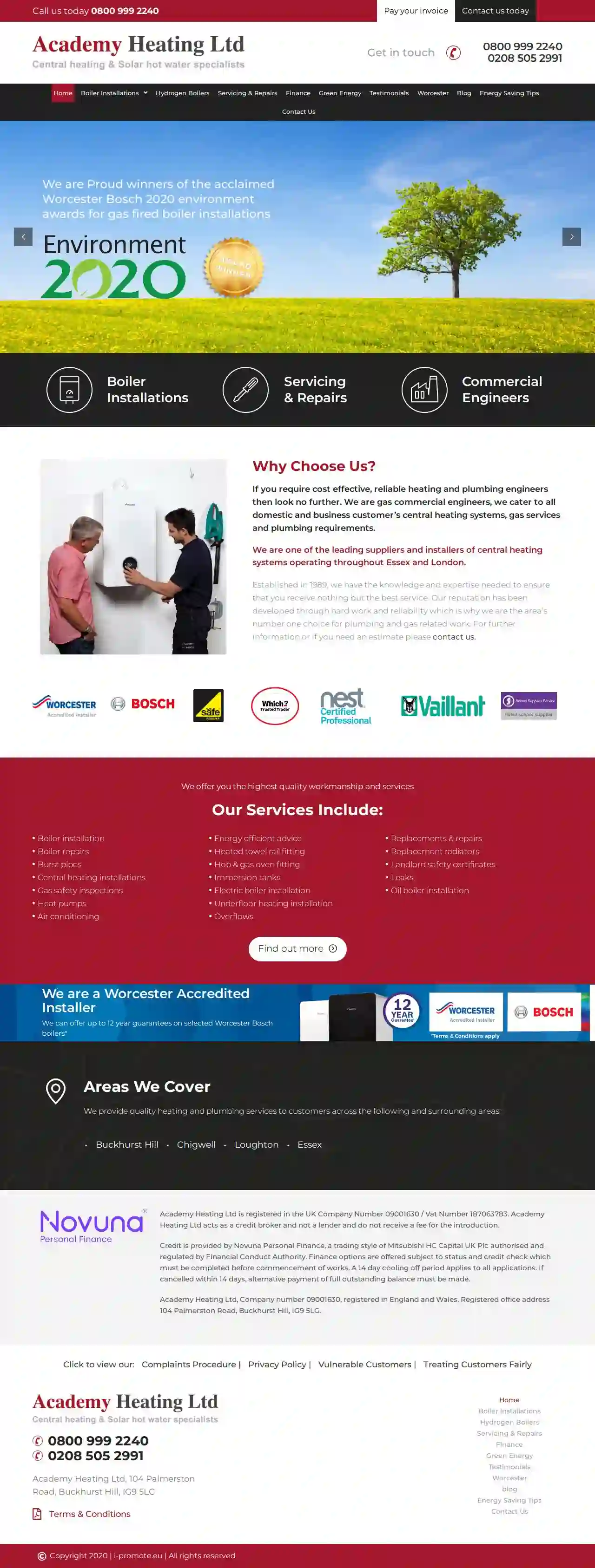
Academy Heating
545 reviews104 Palmerston Road, Buckhurst Hill, IG9 5LG, GBWe are Proud winners of the acclaimed Worcester Bosch 2020 environment awards for gas fired boiler installations. Expert commercial engineers in Buckhurst Hill. Contact us today. Get up to a 12 year guarantee when we install your new boiler.* As Worcester Bosch Accredited Installers, we can offer extended guarantees on selected Worcester Bosch boilers. *T&C’s apply. If you require cost effective, reliable heating and plumbing engineers then look no further. We are gas commercial engineers, we cater to all domestic and business customer’s central heating systems, gas services and plumbing requirements. We are one of the leading suppliers and installers of central heating systems operating throughout Essex and London. Established in 1989, we have the knowledge and expertise needed to ensure that you receive nothing but the best service. Our reputation has been developed through hard work and reliability which is why we are the area’s number one choice for plumbing and gas related work. For further information or if you need an estimate please contact us.
- Services
- Why Us?
- Accreditations
- Gallery
Get Quote
Over 12,692+ HVAC Companies registered
Our HVAC contractors operate in Chigwell & beyond!
HVACCompaniesHub has curated and vetted the Best HVAC Businesses near Chigwell. Find a trustworthy contractor today.
Frequently Asked Questions about Commercial HVAC
- Building Size and Layout: The size and configuration of your business space.
- Business Type: Restaurants, retail stores, and offices all have unique needs.
- Budget: Set a realistic budget for your HVAC project.
- Energy Efficiency: Look for systems with high SEER and AFUE ratings.
- Climate: Consider your local climate conditions.
- Indoor Air Quality Needs: Take into account any indoor air quality standards.
What is a chiller, and how does it work?
How often should I replace the air filters in my commercial HVAC system?
What is an Energy Management System (EMS)?
How do I choose the right HVAC system for my business?
What is a chiller, and how does it work?
How often should I replace the air filters in my commercial HVAC system?
What is an Energy Management System (EMS)?
How do I choose the right HVAC system for my business?
- Building Size and Layout: The size and configuration of your business space.
- Business Type: Restaurants, retail stores, and offices all have unique needs.
- Budget: Set a realistic budget for your HVAC project.
- Energy Efficiency: Look for systems with high SEER and AFUE ratings.
- Climate: Consider your local climate conditions.
- Indoor Air Quality Needs: If you have specific air quality requirements, consider systems with advanced filtration.